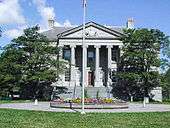28th General Assembly of Newfoundland
The members of the 28th General Assembly of Newfoundland were elected in the Newfoundland general election held in June 1932. The general assembly sat from 1932 to 1934.[1]
28th General Assembly of Newfoundland | |
|---|---|
 Colonial Building seat of the Newfoundland government and the House of Assembly from January 28, 1850, to July 28, 1959. | |
| History | |
| Founded | 1932 |
| Disbanded | 1934 |
| Preceded by | 27th General Assembly of Newfoundland |
| Succeeded by | 29th General Assembly of Newfoundland |
| Leadership | |
Premier | |
| Elections | |
Last election | 1932 Newfoundland general election |
The United Newfoundland Party led by Frederick C. Alderdice formed the government.[2]
James A. Winter served as speaker.[3]
Sir David Murray Anderson served as governor of Newfoundland.[4]
Overwhelmed by debt, the government proposed that it would temporarily reduce its debt payments. Instead, Canada and Britain helped make payments on its debt while a royal commission of enquiry considered Newfoundland's political future. The report, delivered in November 1933, recommended the suspension of responsible government. A Commission of Government would administer Newfoundland until its finances improved and its people wanted a return to responsible government.[2]
Members of the Assembly
The following members were elected to the assembly in 1932:[1]
By-elections
None
References
- "Elections". Encyclopedia of Newfoundland and Labrador. pp. 717–19.
- "Collapse of Responsible Government, 1929-1934". Newfoundland and Labrador Heritage. Memorial University.
- "The Speaker of the House of Assembly". House of Assembly. Archived from the original on 2009-10-13.
- "Anderson, Sir David Murray (1874-1936)". Newfoundland and Labrador Heritage. Memorial University.
External links
- "Members of the last Newfoundland House of Assembly, 1933". Newfoundland and Labrador Heritage. Memorial University.